Module 3 Unit 6 Electricity Grammar 情态动词课件 +嵌入视频(共23张PPT)
文档属性
| 名称 | Module 3 Unit 6 Electricity Grammar 情态动词课件 +嵌入视频(共23张PPT) |
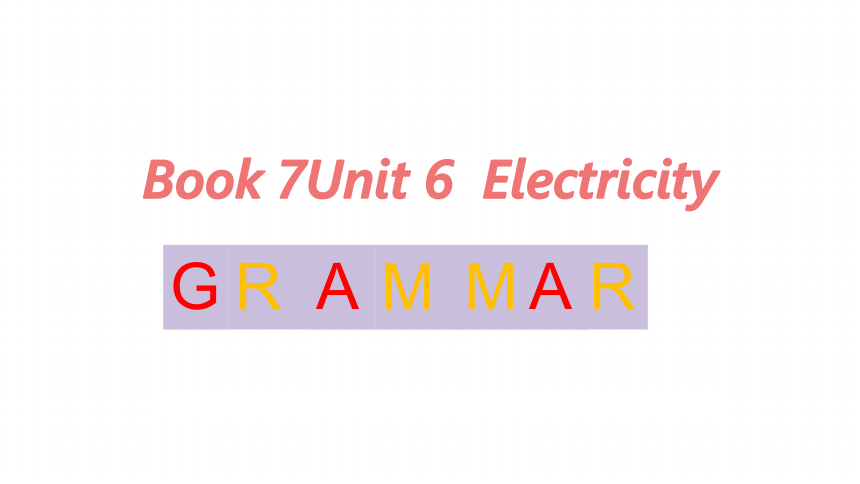
|
|
| 格式 | pptx | ||
| 文件大小 | 10.1MB | ||
| 资源类型 | 教案 | ||
| 版本资源 | 牛津深圳版 | ||
| 科目 | 英语 | ||
| 更新时间 | 2023-10-25 06:40:58 | ||
图片预览


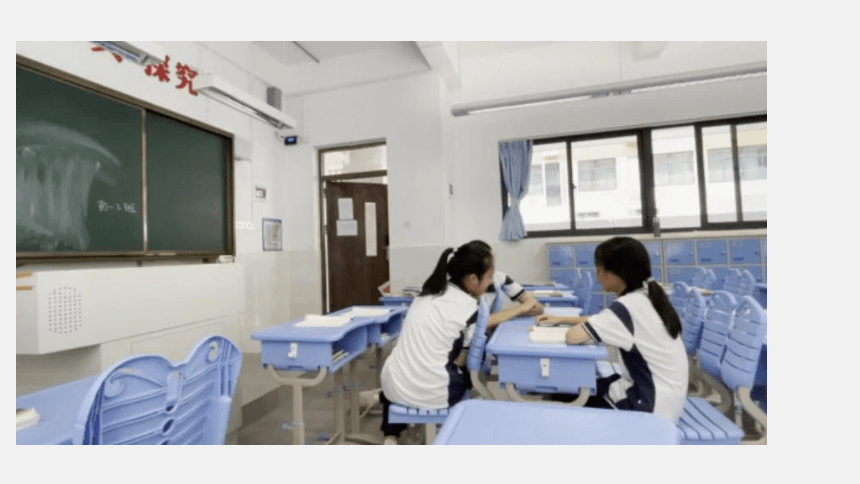
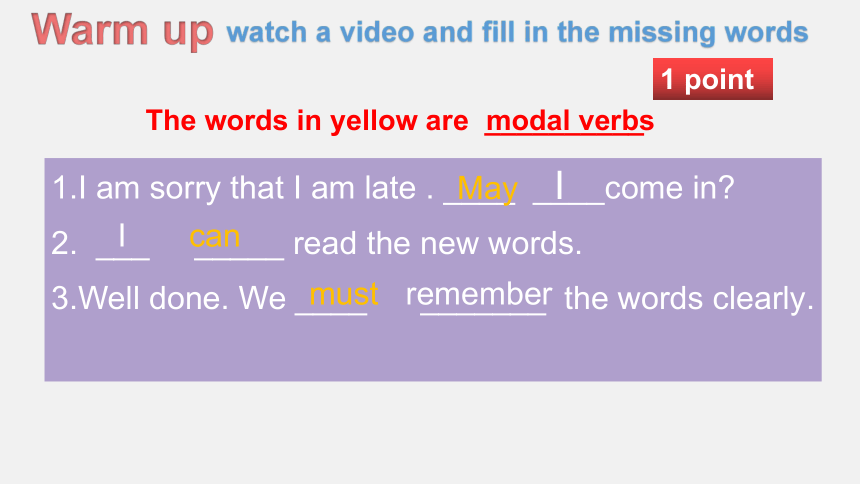
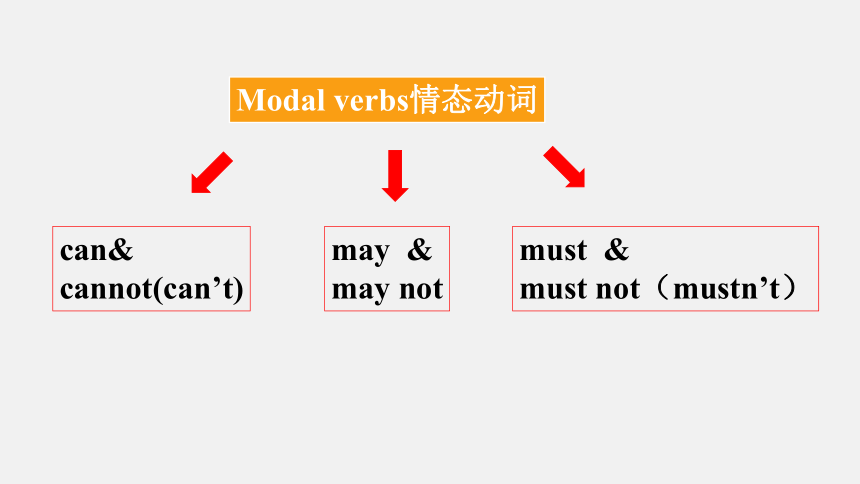
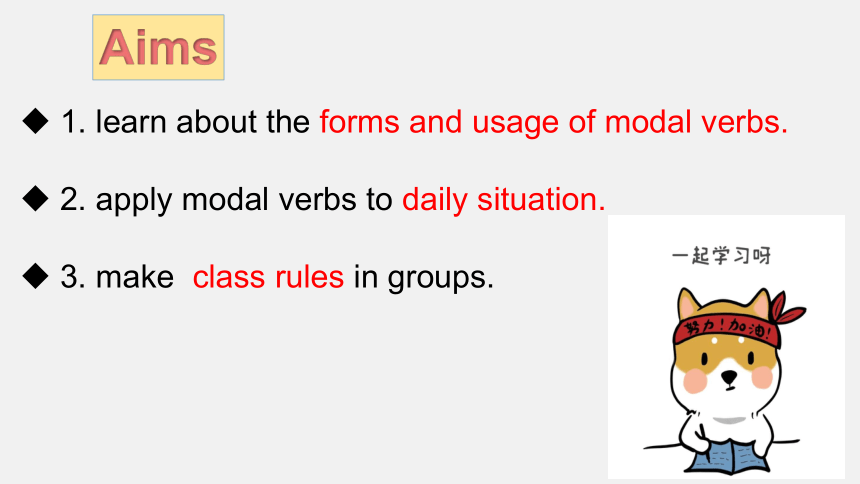
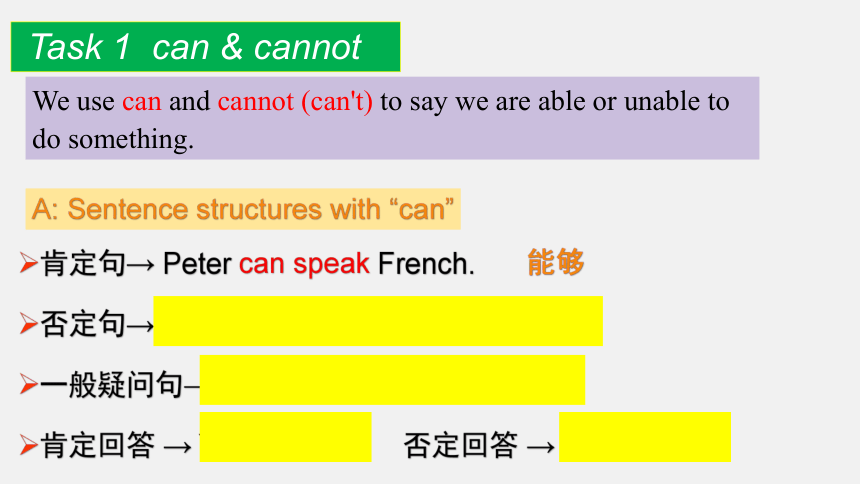
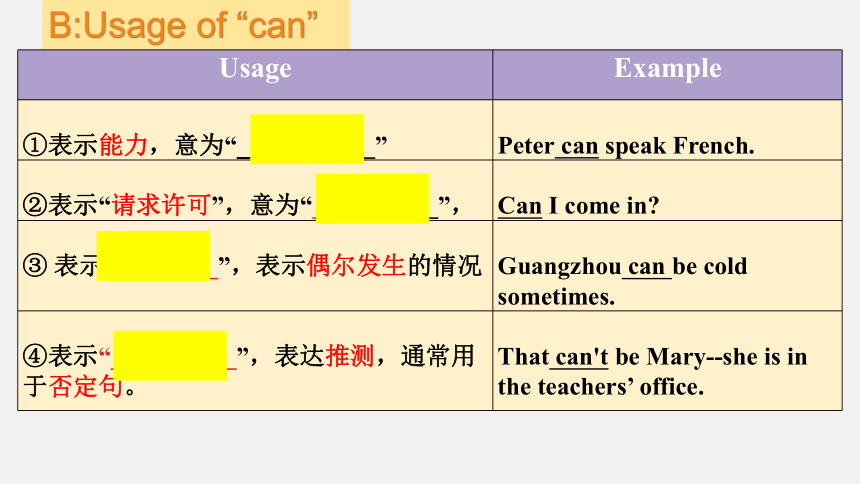
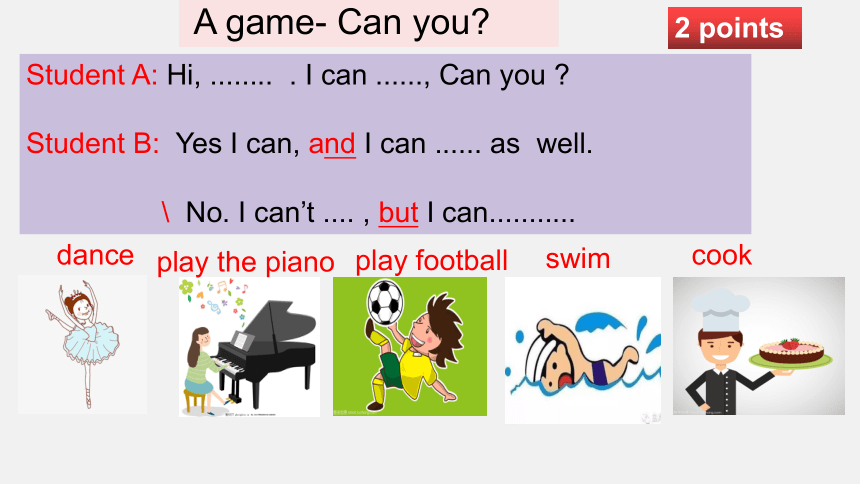
文档简介
(共23张PPT)
Book 7Unit 6 Electricity
G
R
A
M
A
R
M
watch a video and fill in the missing words
Warm up
1.I am sorry that I am late . ____ ____come in
2. ___ _____ read the new words.
3.Well done ! We ______ _______ the words clearly.
1 point
watch a video and fill in the missing words
Warm up
1.I am sorry that I am late . ____ ____come in
2. ___ _____ read the new words.
3.Well done. We ____ _______ the words clearly.
1 point
May I
I can
must remember
The words in yellow are __________
modal verbs
Modal verbs情态动词
can&
cannot(can’t)
may &
may not
must &
must not(mustn’t)
Aims
1. learn about the forms and usage of modal verbs.
2. apply modal verbs to daily situation.
3. make class rules in groups.
肯定句→ Peter can speak French.
否定句→Peter can’t/can not speak French.
一般疑问句→Can Peter speak French
肯定回答 → Yes, he can 否定回答 → No, he can’t
A: Sentence structures with “can”
Task 1 can & cannot
We use can and cannot (can't) to say we are able or unable to do something.
能够
B:Usage of “can”
Usage Example
①表示能力,意为“_ 能够___”
Peter can speak French.
②表示“请求许可”,意为“____可以__”,
Can I come in
③ 表示“可能会__”,表示偶尔发生的情况
Guangzhou can be cold sometimes.
④表示“__不可能__”,表达推测,通常用于否定句。
That can't be Mary--she is in the teachers’ office.
A game- Can you
Student A: Hi, ........ . I can ......, Can you
Student B: Yes I can, and I can ...... as well.
\ No. I can’t .... , but I can...........
2 points
dance
play the piano
play football
swim
cook
我可以在这里拍照吗?
May I take photos here
— (肯定回答) Yes, you may / can.
— (否定回答) No, you may not / can’t
A:Sentence structures with “may”
We use may and may not to ask for and give permission (许可).
Task 2 may & may not
①表示请求同意,意为“可以”,用于疑问句中。
— May I use your phone
—Yes, you may
— No, you may not \ you can't.
②表示可能性, may表示的可能性比can小。
Anna may know my phone number.
安娜可能知道我的电话号码。
B:Usage of “may”
act it out
Student A: get the card and act it out (2 points)
The rest of class : guess what he wants to say (1 point)
Follow the model “May I...... ”
May I borrow your bike
\ May I take a ride
May I have a cup of water
May I turn on the fan \ the air conditioner
May I borrow your pen \ eraser
我必须现在完成作业吗?
— Must I finish the homework now
— (肯定回答) Yes, you must.
— (否定回答) No, you needn’t./No, you don't have to.(不需要)
A:Sentence structure of “must”
Task 3 must & must not
We use must and must not/mustn't to tell people
what to do or what not to do.
必须
①表示规定,命令,强制,意为“必须;一定”,
其否定形式mustn’t 表示 “禁止”。
You must do your homework first.
You mustn’t smoke here.
②表示猜测,意为“一定是”,“准是”,常指比较有把握的推测,
仅用于肯定句。
Jack and Dick must be twins. They look so much alike!
B:Usage of “must”
A game- You mustn’t
What do these signs mean
You mustn’t smoke here.
You mustn’t swim here.
You mustn’t take photos here.
1 point
You mustn’t drink wine.
Mary is a new student .
She is asking Miss Feng about school rules.
1. arrive at school before 7:20 2. hand in homework on time
3. put up hands before speaking in class.
Mary : Miss Feng, must I .......
Miss Feng : Yes, you must.
Mary : Must I.....
Miss Feng: No you needn’t \ No, you don’t have to.
.......................................................
Mary : Thank you Miss Feng.
Miss Feng: You are welcome.
at least
2 points
1. finish homework before school is over.
2. wear a mask everyday (戴口罩).
3. live in school .
MUST
needn’t\ don’t have to
Student A: In the morning, we......
Student B: When we are having classes, we.....
Student C: During the break at noon, we ...
Student D: When we are doing the cleaning, we ....
Student E: After school, we.......
Task 4 Make class rules
At least 3 students talk about class rules.
One point for each student.
Good afternoon, everyone! I am honored to tell you our class rules.
First,...... next, .......then,....... . finally....
I hope all of us can follow the rules and make our class excellent. Thank you
Student A: In the morning, we......
Student B: When we are having classes, we.....
Student C: During the break at noon, we ...
Student D: When we are doing the cleaning, we ....
Student E: After school, we.......
At least 3 students . One point for each student.
English
Show time
情态 动词 用法 否定 及含义 疑问句及回答
共同点
can 意为“能” 否定: cannot /can't 含义: 不能 --Can I ... --Yes, I can. --No,I can't.
其后用动词原形
may 意为“可以” 否定:may not 含义:不可以 --May I... --Yes, you may. --No, you may not/ can't must 意为“必须” 否定:must not /mustn't 含义:禁止 -Must I.... --Yes, you must. --No, you needn' t / you don't have to. Task 5 Summary & Review
I know the usage of “can, may ,must “ Good Just so so
Not a bit
I know how to make sentences with “can, may , must” Good Just so so
Not a bit
Self assessment-tick the choices
Assignment
1. Review the usage of modal verbs “ can, may must”
2. Polish class rules and make a poster on “Our class rules”
Book 7Unit 6 Electricity
G
R
A
M
A
R
M
watch a video and fill in the missing words
Warm up
1.I am sorry that I am late . ____ ____come in
2. ___ _____ read the new words.
3.Well done ! We ______ _______ the words clearly.
1 point
watch a video and fill in the missing words
Warm up
1.I am sorry that I am late . ____ ____come in
2. ___ _____ read the new words.
3.Well done. We ____ _______ the words clearly.
1 point
May I
I can
must remember
The words in yellow are __________
modal verbs
Modal verbs情态动词
can&
cannot(can’t)
may &
may not
must &
must not(mustn’t)
Aims
1. learn about the forms and usage of modal verbs.
2. apply modal verbs to daily situation.
3. make class rules in groups.
肯定句→ Peter can speak French.
否定句→Peter can’t/can not speak French.
一般疑问句→Can Peter speak French
肯定回答 → Yes, he can 否定回答 → No, he can’t
A: Sentence structures with “can”
Task 1 can & cannot
We use can and cannot (can't) to say we are able or unable to do something.
能够
B:Usage of “can”
Usage Example
①表示能力,意为“_ 能够___”
Peter can speak French.
②表示“请求许可”,意为“____可以__”,
Can I come in
③ 表示“可能会__”,表示偶尔发生的情况
Guangzhou can be cold sometimes.
④表示“__不可能__”,表达推测,通常用于否定句。
That can't be Mary--she is in the teachers’ office.
A game- Can you
Student A: Hi, ........ . I can ......, Can you
Student B: Yes I can, and I can ...... as well.
\ No. I can’t .... , but I can...........
2 points
dance
play the piano
play football
swim
cook
我可以在这里拍照吗?
May I take photos here
— (肯定回答) Yes, you may / can.
— (否定回答) No, you may not / can’t
A:Sentence structures with “may”
We use may and may not to ask for and give permission (许可).
Task 2 may & may not
①表示请求同意,意为“可以”,用于疑问句中。
— May I use your phone
—Yes, you may
— No, you may not \ you can't.
②表示可能性, may表示的可能性比can小。
Anna may know my phone number.
安娜可能知道我的电话号码。
B:Usage of “may”
act it out
Student A: get the card and act it out (2 points)
The rest of class : guess what he wants to say (1 point)
Follow the model “May I...... ”
May I borrow your bike
\ May I take a ride
May I have a cup of water
May I turn on the fan \ the air conditioner
May I borrow your pen \ eraser
我必须现在完成作业吗?
— Must I finish the homework now
— (肯定回答) Yes, you must.
— (否定回答) No, you needn’t./No, you don't have to.(不需要)
A:Sentence structure of “must”
Task 3 must & must not
We use must and must not/mustn't to tell people
what to do or what not to do.
必须
①表示规定,命令,强制,意为“必须;一定”,
其否定形式mustn’t 表示 “禁止”。
You must do your homework first.
You mustn’t smoke here.
②表示猜测,意为“一定是”,“准是”,常指比较有把握的推测,
仅用于肯定句。
Jack and Dick must be twins. They look so much alike!
B:Usage of “must”
A game- You mustn’t
What do these signs mean
You mustn’t smoke here.
You mustn’t swim here.
You mustn’t take photos here.
1 point
You mustn’t drink wine.
Mary is a new student .
She is asking Miss Feng about school rules.
1. arrive at school before 7:20 2. hand in homework on time
3. put up hands before speaking in class.
Mary : Miss Feng, must I .......
Miss Feng : Yes, you must.
Mary : Must I.....
Miss Feng: No you needn’t \ No, you don’t have to.
.......................................................
Mary : Thank you Miss Feng.
Miss Feng: You are welcome.
at least
2 points
1. finish homework before school is over.
2. wear a mask everyday (戴口罩).
3. live in school .
MUST
needn’t\ don’t have to
Student A: In the morning, we......
Student B: When we are having classes, we.....
Student C: During the break at noon, we ...
Student D: When we are doing the cleaning, we ....
Student E: After school, we.......
Task 4 Make class rules
At least 3 students talk about class rules.
One point for each student.
Good afternoon, everyone! I am honored to tell you our class rules.
First,...... next, .......then,....... . finally....
I hope all of us can follow the rules and make our class excellent. Thank you
Student A: In the morning, we......
Student B: When we are having classes, we.....
Student C: During the break at noon, we ...
Student D: When we are doing the cleaning, we ....
Student E: After school, we.......
At least 3 students . One point for each student.
English
Show time
情态 动词 用法 否定 及含义 疑问句及回答
共同点
can 意为“能” 否定: cannot /can't 含义: 不能 --Can I ... --Yes, I can. --No,I can't.
其后用动词原形
may 意为“可以” 否定:may not 含义:不可以 --May I... --Yes, you may. --No, you may not/ can't must 意为“必须” 否定:must not /mustn't 含义:禁止 -Must I.... --Yes, you must. --No, you needn' t / you don't have to. Task 5 Summary & Review
I know the usage of “can, may ,must “ Good Just so so
Not a bit
I know how to make sentences with “can, may , must” Good Just so so
Not a bit
Self assessment-tick the choices
Assignment
1. Review the usage of modal verbs “ can, may must”
2. Polish class rules and make a poster on “Our class rules”
